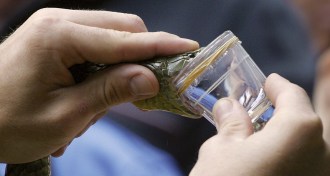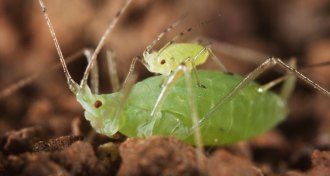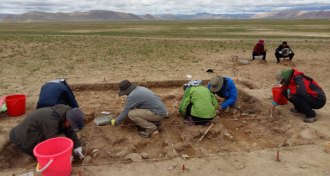News in Brief
-
 Space
SpaceThe sugar that makes up DNA could be made in space
Deoxyribose, the sugar of DNA, was created in a lab simulating ice in space.
-
 Neuroscience
NeuroscienceHere’s a rare way that an Alzheimer’s protein can spread
Amyloid-beta found in vials of growth hormone can move from brain to brain, a mouse study shows.
-
 Astronomy
AstronomyThe Parker Solar Probe takes its first up-close look at the sun
NASA’s Parker Solar Probe survived its first encounter with the sun and is sending data back to Earth.
-
 Life
LifeBiologists are one step closer to creating snake venom in the lab
Milking snakes for venom may soon no longer be needed to make antidotes for bites.
-
 Life
LifeGetting goose bumps could boost hair growth
The same nerves and muscles that create goose bumps may make hair grow.
-
 Physics
PhysicsA satellite screw-up reaffirms Einstein’s theory of gravity
Two spacecraft confirm that time passes more slowly closer to Earth’s surface.
-
 Materials Science
Materials ScienceMagnets make a new soft metamaterial stiffen up in a flash
Scientists can dial the stiffness of a bizarre new type of synthetic material up or down using magnets.
-
 Climate
ClimateGlobal carbon dioxide emissions will hit a record high in 2018
Carbon dioxide emissions from China, the United States and India all rose this year, a new report finds.
-
 Animals
AnimalsPea aphid youngsters use piggyback rides to escape a crisis
When some mammal is about to munch their plant, aphids drop to the ground and youngsters want a ride to safety.
By Susan Milius -
 Life
LifeHow some sap-sucking insects fling their pee
Sharpshooters hurl their pee with structure called a stylus, which sends droplets flying at 20 times the acceleration of Earth’s gravity.
-
 Particle Physics
Particle PhysicsThe Large Hadron Collider is shutting down for 2 years
The world’s largest particle accelerator will restart in 2021 at higher energy.
-
 Archaeology
ArchaeologyStone Age people conquered the Tibetan Plateau’s thin air
Stone tools that are at least 30,000 years old suggest that people settled the high-altitude Tibetan Plateau earlier than scientists thought.
By Bruce Bower